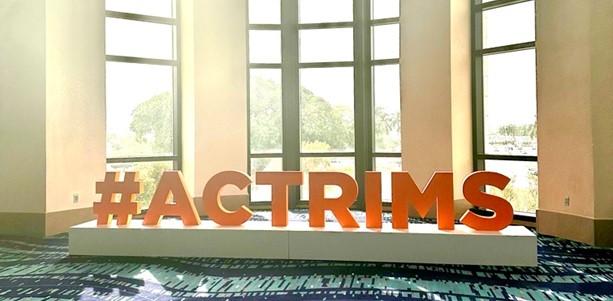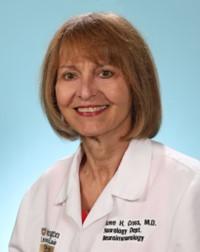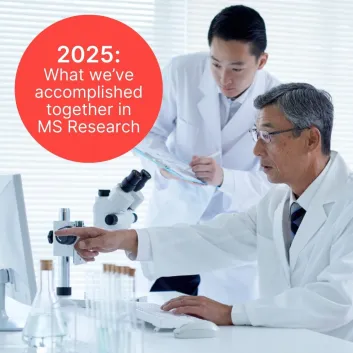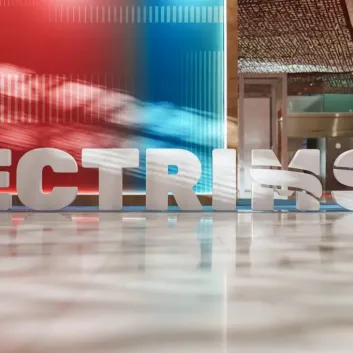- Research
- March 25, 2024
Breaking Barriers in MS
Research Highlights from ACTRIMS Forum 2024

We're excited to share with you some emerging research from the 9th annual Americas Committee for Treatment and Research in Multiple Sclerosis (ACTRIMS) Forum. The meeting took place on February 29th - March 2nd in sunny West Palm Beach, Florida – bringing together researchers, trainees, healthcare professionals, and others to discuss exciting advances in the science and treatment of MS and related disorders.
This year’s meeting focused on “Breaking Barriers in MS” and included discussions on advancing treatment and care, promoting repair and remyelination, targeting compartmentalized inflammation, and much more!
Here are some research highlights from the forum.
Kenneth P. Johnson Memorial Lecture

Each year, ACTRIMS presents an opening lecture in honour of the late Dr. Kenneth P. Johnson, a world-renowned leader in MS research and treatment. This lecture recognizes a clinician or researcher for their knowledge, accomplishments, and contributions to MS. This year, Dr. Anne Cross (Washington University in St. Louis) was selected to deliver the lecture on B cell therapies in MS. In recent years, we have made significant advancements in our understanding of how B cells contribute to MS pathology and have developed effective therapies targeting B cells for the treatment of MS. Dr. Cross led the first phase 2 trial of rituximab as an “add-on” B cell therapy for people with active relapsing MS and whose current treatment with interferon beta or glatiramer acetate was failing. Dr. Cross shared that the development of rituximab and other B cell therapies are very effective in rapidly reducing MRI activity and clinical relapses in people with relapsing MS, but they are not as effective in people with progressive MS. More research is needed to understand the role of B cells in progressive MS.
2024 Barancik Prize for Innovation in MS Research

The Barancik Prize, presented by the National MS Society, recognizes exceptional scientists whose work in MS research demonstrates outstanding innovation to accelerate the development of new treatments for MS. Dr. Sergio Baranzini (University of California San Francisco) is the recipient of this year’s Barancik Prize. His research is focused on combining and analyzing large amounts of data to better understand the mechanisms that cause MS and to develop effective strategies to halt and prevent the disease.
Dr. Baranzini is a leader of the International Multiple Sclerosis Genetics Consortium (IMSGC) and was involved in identifying over 200 genetic variants related to the likelihood of developing MS. More recently, Dr. Baranzini and team discovered the first genetic variant linked to faster MS disability progression (read more here). Dr. Baranzini also established the International MS Microbiome Study to examine the role of gut bacteria in MS onset, disease course, and treatment response. Additionally, Dr. Baranzini is the founder of SPOKE – a knowledge database that connects existing molecular, clinical, and environmental data to see how they interact together. One specific use of SPOKE is to use real-world patient health data to accurately predict MS disease status for up to three years before diagnosis. This technology has the potential to identify individuals in the MS prodromal period so they can be monitored and/or treated before the onset of their clinical symptoms.
Advancing Treatment & Care
Dr. Dimitrios Karussis (Hadassah University) presented initial findings from an ongoing trial where mesenchymal stem cells are administered in 23 people with progressive MS. Dr. Karussis and team showed that repeated injection of mesenchymal stem cells (at least two injections) in people with progressive MS was safe, showed beneficial effects on cognition and quality of life, and most importantly led to a significant decrease in biomarkers of neuroinflammation and neurodegeneration (glial fibrillary acidic protein or GFAP and serum neurofilament light chain or NfL). This first look at the data seems hopeful, and we are excited to see full results from the study.
Dr. Marissa McGinley (Cleveland Clinic) talked about the advantages of teleneurology or telemedicine – where you can receive neurological services using technology instead of going in-person to a doctor’s office – as an option to improve access to MS care. She shared results from the National Teleneurology Program where participants, approximately 50% of which were from rural regions, scheduled and completed their assessments faster in comparison to in-person visits and were highly satisfied with their experience. More research is needed to understand how to integrate teleneurology in standard MS care, its impact on patient health outcomes, and address potential roadblocks in delivering this type of care (i.e., limited access to internet or a digital device, limited broadband, lack of digital literacy, etc.).
Promoting Repair & Remyelination
Dr. Larissa Jank (Johns Hopkins University) shared findings on a novel agent that helps repair myelin for MS. Indole-3-lactate (ILA) is a molecule primarily produced by bacteria in the gut and is also found in fermented foods. The research team showed that ILA is present in lower levels in people with progressive MS and that oral supplementation with ILA reduced neuroinflammation and promoted remyelination in a mouse model of MS. More research is needed to test how safe and effective ILA supplementation will be as a treatment for people with MS.
Dr. Brad Lang (Convelo Therapeutics) presented a group of new drug candidates for enhancing remyelination in MS. These candidates were designed to target proteins involved in cholesterol processing – CVL1001 (EBP inhibitor) and CVL2002 (CYP51 inhibitor). Treating MS mouse models with CVL1001 or CVL2002 led to accelerated remyelination of neurons. These drug candidates are in the pre-clinical stage of testing, but they look promising for repairing myelin in MS. More research is needed to confirm their safety and effectiveness in people with MS.
Dr. Krystyn Van Vliet (Cornell University) shared her cutting-edge research in creating ‘artificial axons’ that have the same features as real nerve fibres in the brain and spinal cord. These artificial axons may be a new method to quickly test drug candidates with the potential to promote repair and remyelination in MS.
Targeting Compartmentalized Inflammation
Compartmentalized inflammation occurs when immune cells become trapped within the central nervous system (CNS; brain and spinal cord). This type of inflammation is difficult to target with current disease-modifying therapies and thought to be a key contributor of the processes that lead to disease progression in MS.
Dr. Jo Anne Stratton (McGill University) talked about how compartmentalized inflammation can damage specialized cells in the brain (called ependymal cells) and allow entry of toxic factors that can harm the brain tissue, ultimately leading to disease progression in MS. Dr. Stratton and team are further studying the mechanisms and factors that damage ependymal cells to develop treatments that can slow down MS progression. Read more on this MS Canada-funded study here.
Dr. Dimitrios Davalos (Cleveland Clinic) talked about a molecule found in microglia (called Endothelin-1) and its role in disrupting the blood-brain barrier in MS. The blood-brain barrier is a protective membrane that controls what flows in and out of the brain from the blood. Dr. Davalos and team believe that the microglia are producing a signal through Endothelin-1 to attract immune cells and inflammatory factors to the blood-brain barrier and allowing these harmful factors to infiltrate the CNS. Endothelin-1 could therefore be a promising novel therapeutic target to prevent compartmentalized inflammation in MS.
Dr. Maria Lehtinen (Boston Children's Hospital, Harvard Medical School) shared a cutting-edge approach to capture brain cell activities as they happen to determine what factors may contribute to inflammation in the CNS. Use of these approaches in animal models of MS will be important in advancing our understanding of compartmentalized inflammation and disease mechanisms in MS.
Additional resources:
Our overview only captures a few of the latest breakthroughs in MS research presented at ACTRIMS 2024. For more information, you can access the ACTRIMS abstract catalog.
If you're interested in learning about what these latest breakthroughs in MS research could mean for people affected by MS, you can access the ACTRIMS first ever post-forum webinar series “Breaking Communication Barriers Between MS Clinicians & Researchers and People Living with MS”.
- Log in to post comments

